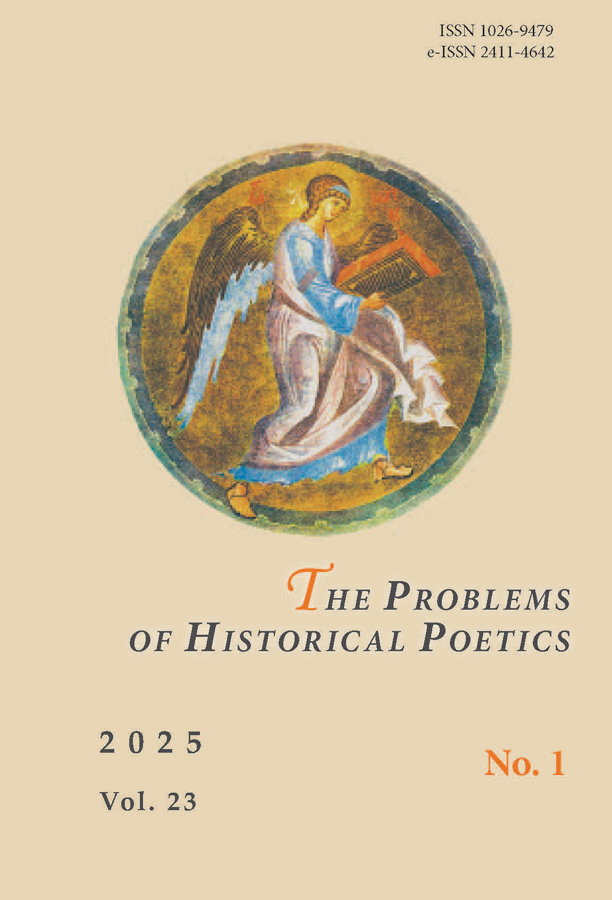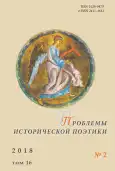The Recovery of the Dead in the Creative Work of A. Platonov
- Authors: Spiridonova I.A.1
-
Affiliations:
- Petrozavodsk State University
- Issue: Vol 16, No 2 (2018)
- Pages: 194-213
- Section: Articles
- URL: https://bakhtiniada.ru/1026-9479/article/view/295313
- DOI: https://doi.org/10.15393/j9.art.2018.5201
- ID: 295313
Cite item
Full Text
Abstract
The article explores the evolution of one of the central themes of A. Platonov’s work — the recovery of the dead. It has evangelical origins and is inextricably linked with the problems of life, death, immortality, salvation. The complex attribution of actualized artistic nominations and their equivalents to different sources can be traced in its development. In the revolutionary eschatology of the young Platonov (1910–1920), the reinterpretation of the New Testament view of the opposition of life-death, remythologization and utopian transcription of the evangelical images and plots is traced. In the novel “Chevengur”, in the works of the 1930s–1940s the restoration of meanings and symbols of the New Testament takes place. The Christian code plays an important role in the creative work of Platonov. In the development of the theme of the recovery of the deceased, the writer’s evolution appears as the return to the sources of folk spirituality and faith.
Keywords
About the authors
Irina A. Spiridonova
Petrozavodsk State University
Author for correspondence.
Email: verses@onego.ru
Doctor of Philology, Professor of the Department of Classical Philology, Russian Literature and Journalism
Russian Federation, PetrozavodskReferences
- Aleynikov O. Hagiographic Motifs in Andrei Platonov’s Prose About the Great Patriotic War. In: «Strana filosofov» Andreya Platonova: problemy tvorchestva [“Country of Philosophers” by Andrei Platonov: The Problems of Creative Work]. Moscow, Institute of World Literature, Russian Academy of Sciences Publ., 2003, issue 5, pp. 144–145. (In Russ.)
- Borenstayn E. The Text as a Machine of Death: Military Stories by A. Platonov. In: Voyna i literatura. 1941–1945 [War and Literature. 1941–1945]. Yekaterinburg, Ural State University Publ., 2000, pp. 109–118. (In Russ.)
- Geller M. Andrey Platonov v poiskakh schast’ya [Andrei Platonov in Search of Happiness]. Paris, Ymca Press Publ., 1982. 408 p. (In Russ.)
- Duzhina N. “Constant Ideals” by Andrei Platonov in the Second Half of the 1930s. In: «Strana filosofov» Andreya Platonova: problemy tvorchestva [“Country of Philosophers” by Andrei Platonov: The Problems of Creative Work]. Moscow, Institute of World Literature, Russian Academy of Sciences Publ., 2003, issue 5, pp. 35–47. (In Russ.)
- Kolesnikova E. I. Malaya proza Andreya Platonova. Konteksty. Khudozhestvennye konstanty. Printsipy publikatsii [Andrei Platonov’s Short Prose: Artistic Constants. The Principles of Publication]. St. Petersburg, St. Petersburg State University of Industrial Technologies and Design Publ., 2013. 496 p. (In Russ.)
- Kornienko N. V. Commentaries. In: Platonov A. Sobranie sochineniy: v 8 tomakh [Platonov A. Collected Works: in 8 Vols]. Мoscow, Vremya Publ., 2010, vol. 5: There Is no Death! Stories and Essays of 1941–1945, pp. 499–541. (In Russ.)
- Merezhkovskiy D. Polnoe sobranie sochineniy: v 17 tomakh [The Complete Works: in 17 Vols]. Мoscow, 1911, vol. 11. 224 p. (In Russ.)
- Savkin I. The Alive and the Dead: the Problem of a New Image of History in the Prose of Andrei Platonov. In: Silentium. Filosofsko-khudozhestvennyy al’manakh [Silentium. Philosophical and Artistic Almanac]. St. Petersburg, 1991, issue 1, pp. 42–54. (In Russ.)
- Skobelev V. Resurrecting Love to the Mortals: (from “Fro” to the “River Potudan” and to the “The Return”: Based on the Novel’s Poetics Observations. In: «Strana filosofov» Andreya Platonova: problemy tvorchestva [“Country of Philosophers” by Andrei Platonov: The Problems of Creative Work]. Moscow, Institute of World Literature, Russian Academy of Sciences Publ., 2003, issue 5, pp. 621–628. (In Russ.)
- Heidegger М. Bytie i vremya [Being and Time]. Мoscow, Ad Marginem Publ., 1997. 422 p. (In Russ.)
- Eydinova V. V. The Style Thinking of Andrei Platonov (Military Prose of the Writer). In: Voyna i literatura. 1941–1945 [War and Literature. 1941–1945]. Yekaterinburg, Ural State University Publ., 2000, pp. 118–127. (In Russ.)
- Bethea David M. The Shape of Apocalypse in Modern Russian Fiction. Princeton, NJ, Princeton University Press Publ., 1988. 348 p. (In English)
- Hodel R. Uglossia — Tongue-tie, Objective Narrative — a Tale (To the Beginning of the Novel Chevengur). In: Sprache und Erzählhaltung bei Andrei Platonov [Language and Storytelling by Andrei Platonov]. Bern, 1998, pp. 149–160. (In Russ.)
- Seifrid T. Platonov’s Blindness. In: Ulbandus Review, 2011/2012, vol. 14: Andrei Platonov: Style, Context, Meaning, pp. 289–301. (In English)
- Valmark S. Efterord [The Afterword]. In: Platonov A. Don Quijote i revolutionen [Platonov A. Don Quixote and Revolution]. Stockholm, P. A. Norstedt & Söners förlag Publ., 1973, pp. 313–317. (In Swedish)
Supplementary files











